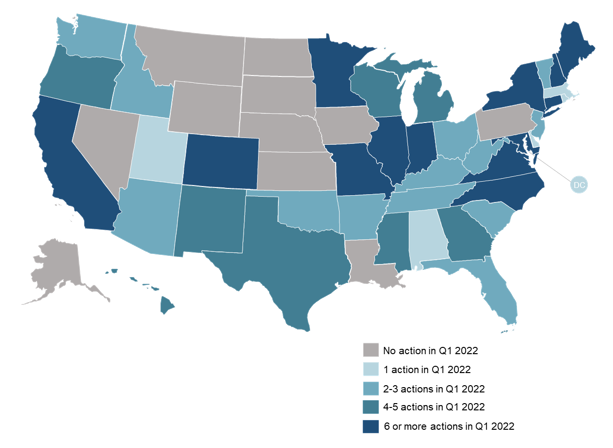The 50 States of Solar: States Explore Incentives and Low-Income Customer Provisions in Net Metering Reviews During Q1 2022
Raleigh, NC – (April 20, 2022) The N.C. Clean Energy Technology Center (NCCETC) released its Q1 2022 edition of The 50 States of Solar. The quarterly series provides insights on state regulatory and legislative discussions and actions on distributed solar policy, with a focus on net metering, distributed solar valuation, community solar, residential fixed charges, residential demand and solar charges, third-party ownership, and utility-led rooftop solar programs.
The report finds that 39 states, plus the District of Columbia, took some type of distributed solar policy action during Q1 2022 (see figure below), with the greatest number of actions continuing to address net metering policies (64), community solar policies (51), and residential fixed charge or minimum bill increases (31). A total of 195 distributed solar policy actions were taken during Q1 2022 – the highest number yet during an individual quarter – with the most actions taken in Illinois, New York, California, Missouri, Maryland, New Hampshire, Virginia, Connecticut, and Maine.
Q1 2022 Policy Action on Net Metering, Rate Design, and Solar Ownership

The report identifies three trends in solar policy activity taken in Q1 2022: (1) states exploring upfront incentives in the context of net metering reforms, (2) new states considering community solar programs, and (3) states proposing low-income customer provisions in net metering rules.
“We’ve recently seen a new trend of states and utilities considering the coupling of net metering policies with upfront incentives,” noted Brian Lips, Senior Policy Project Manager at NCCETC. “Duke Energy attempted to couple revisions to its net metering rules in South Carolina with a smart thermostat demand control incentive program, while California regulators have included energy storage incentives within their proposed Net Metering 3.0 rules, and the Mississippi Public Service Commission recommended upfront cash incentives to make the state’s DG rules more favorable for low-income customers.”
The report notes the top five distributed solar policy actions of Q1 2022:
- The Indiana Court of Appeals reversing a Commission decision on Vectren’s net metering successor tariff;
- Florida lawmakers passing legislation adopting reforms to the state’s net metering rules;
- The Mississippi Public Service Commission filing proposed net metering rule revisions;
- DTE Electric filing a proposal with Michigan regulators to implement a new demand charge for distributed generation customers; and
- Hawaii regulators approving a framework for a new distributed energy resources tariff incorporating time-of-use rates.
“More states are exploring the integration of income-specific provisions into their net metering rules, providing additional incentives for LMI customers to encourage greater participation in these programs,” observed Rebekah de la Mora, Policy Analyst at NCCETC. “Connecticut regulators approved LMI adders as part of its new renewable energy tariff and is in the process of reviewing equitable measures for multifamily affordable housing, while Mississippi is considering new upfront rebates on top of its existing LMI net metering adder.”
View the 50 States of Solar Q1 2022 Quarterly Report Executive Summary
View and Purchase the 50 States of Solar 2022 Q1 Update FULL Report
View other 50 States Reports – Solar, Grid Modernization and Electric Vehicles
ABOUT THE N.C. CLEAN ENERGY TECHNOLOGY CENTER
The N.C. Clean Energy Technology Center, as part of the College of Engineering at North Carolina State University, advances a sustainable energy economy by educating, demonstrating and providing support for clean energy technologies, practices and policies. It serves as a resource for innovative, sustainable energy technologies through technology demonstration, technical assistance, outreach and training. For more information about the Center, visit: http://www.nccleantech.